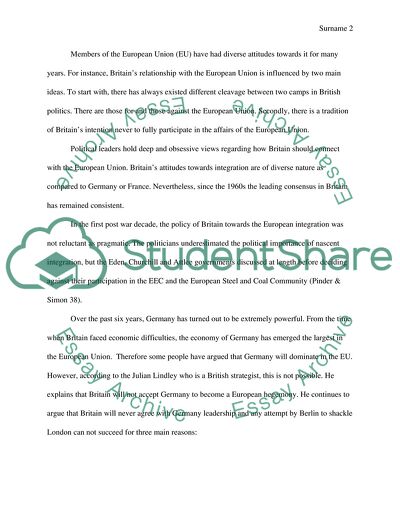
- Home
- Free Samples
- Premium Essays
- Editing Services
- Extra Tools
- Essay Writing Help
- About Us
- Studentshare
- Subjects
- Miscellaneous
- European political systems
European political systems - Essay Example

- Subject: Miscellaneous
- Type: Essay
- Level: Masters
- Pages: 4 (1000 words)
- Downloads: 0
- Author: hollisblock
Extract of sample "European political systems"
These requirements were; an established democracy, a well operational market economy and acceptance of the membership obligations. Since then, more members have joined and the number has even tripled. Members of the European Union (EU) have had diverse attitudes towards it for many years. For instance, Britain’s relationship with the European Union is influenced by two main ideas. To start with, there has always existed different cleavage between two camps in British politics. There are those for and those against the European Union.
Secondly, there is a tradition of Britain’s intention never to fully participate in the affairs of the European Union. Political leaders hold deep and obsessive views regarding how Britain should connect with the European Union. Britain’s attitudes towards integration are of diverse nature as compared to Germany or France. Nevertheless, since the 1960s the leading consensus in Britain has remained consistent. In the first post war decade, the policy of Britain towards the European integration was not reluctant as pragmatic.
The politicians underestimated the political importance of nascent integration, but the Eden, Churchill and Attlee governments discussed at length before deciding against their participation in the EEC and the European Steel and Coal Community (Pinder & Simon 38). Over the past six years, Germany has turned out to be extremely powerful. From the time when Britain faced economic difficulties, the economy of Germany has emerged the largest in the European Union. Therefore some people have argued that Germany will dominate in the EU.
However, according to the Julian Lindley who is a British strategist, this is not possible. He explains that Britain will not accept Germany to become a European hegemony. He continues to argue that Britain will never agree with Germany
...Download file to see next pages Read More
- TERMS & CONDITIONS
- PRIVACY POLICY
- COOKIES POLICY